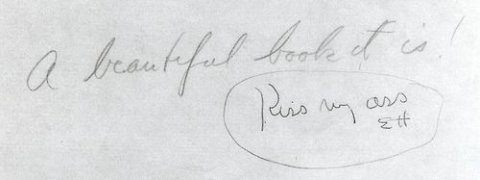
So everyone knows Hemingway was a bruiser. Some of the best stories of his macho posturing involve fellow writers. There was, of course, that time he and Wallace Stevens slugged it out in Key West. I’ve been told Stevens asked for it, drunkenly telling Hemingway’s sister Ursula that her brother wrote like a little boy. I don’t know whose version of the story this comes from, but by all accounts, Hemingway knocked the bear of a poet down several times. The two made up soon after. Then there’s the story of Hemingway and James Joyce; the diminutive Irish writer apparently hid behind his pugnacious friend when trouble loomed.
There are many other such yarns, I’m sure, but one I’ve just learned of shows us a much more passive-aggressive side of Papa H. As the John F. Kennedy Presidential Library blog informs us, Hemingway once sent F. Scott Fitzgerald a typescript of A Farewell to Arms. Fitzgerald sent back ten pages of edits and comments, signing off with “A beautiful book it is!” You can see Hemingway’s first reaction above (signed EH). In later drafts, it seems, he took some of Fitzgerald’s advice to heart.
via @matthiasrascher
Related Content:
Seven Tips From Ernest Hemingway on How to Write Fiction
F. Scott Fitzgerald in Drag (1916)
James Joyce in Paris: “Deal With Him, Hemingway!”
Josh Jones is a writer and musician based in Washington, DC. Follow him @jdmagness


Then of course there’s the time Hemingway got his own pugnacious ass handed to him by a little Canadian writer of some minor merit called Morley Callaghan.
You can read about it here:http://www.thesweetscience.com/article-archive/2004/1279-ernest-hemingway-literary-giant-and-boxing-pretender
Callaghan went on to outlive both Fitzgerald and Hemingway, he died in Toronto in, I think, 1990…
I like the Burroughs quote about Hemingway, something along the lines of, “Regrettably, Hemingway chose to live out the least interesting aspects of his fiction.”
Like landing on D‑Day?
Ed Desautels and Burroughs, kiss my ass!
One thing is sure, he never started a sentence with the word “so.” A true genius.
Hemingway’s pugilistics are about as interesting as Jack Dempsey’s fiction..
Hemingway was a fine writer if not a gentleman. F Scott Fitzgerald was a snibling whiner, a wastrel and a decadent. My worst English class in college was the semester we had to study “Great Gatsby”…paragraph by paragraph.…it was a “Great Waste” of my college life.…
- there’s nothing wrong with a little (or a lot) of decadence, you know. As for all this ‘Thomas the tank engine’ pugilism — only proves that they believe actions speak louder than words, maybe they do to imbeciles — Proust said men judge each other by their actions (and presumably not by their words) but it is all a matter of volume — you know ? Quantity, not quality.
Hem had natural boxing abilities! He had celebrity too, rather a young fellow with “The Sun Also Rises”. And it is known he liked to spar with the Pro’s. He wouldn’t have found trouble finding such sparring partners, either. And, according to some professional estimations he was bearish and plodding but with an effective right, as good a punch as could be found! He fought everybody! Would fight the toughest looking guy at a dockside dive! While this might be true (Dempsey’s estimation of the man), Hem was a real tough guy, a “genuine”!
this is a nice novel and i also read it and its having a nice story
website;-http://www.iecci.com/
this story is awesome and i loved it
website;-http://www.iecci.com/
I spent 20 years studying Hemingway and everything he wrote. I even went so far as to go to Berlin and the American Library to study every word. There I held in my hand a rare edition of RARE EARTH—the manuscript for a film he made for the Spanish CIVIL WAR on the side of the Republicans and against Fascist Franco.
Hemingway drank and smoked far too much and it addled his mind. He also encured many concussions and he might have suffered later in life from brain damage and certainly depression. These vices and accidents hurt him and he literally lost his mind and died of suicide in a very grim way—using a shotgun.
Hemingway is not one to emulate by any young person regarding his private life. He was aggressive and in the end, ALL THE FAMOUS PEOPLE HE KNEW HE ALIENATED, ARGUED WITH, AND PUSHED AWAY.
He also was incredibly famous at a young age for his coming back first from World War I, the wounded Italian lieutenant ambulance driver. Then the rest of his life was one famous episode after another: One of the expatriates in Paris, the bull fighting thing, the African thing, the Spanish Civil War thing, first to China, overseas correspondent, and war correspondent who was first into Paris before de Gaul, leading a group of French Patisans. (He carried a weapon and it almost got him in jail.) Oh, and there was the Pilar thing where the government equipped his fishing boat, the Pilar with anti-submarine devices. A LOT OF FIRSTS FOR ONE MAN—MAKING HIM EVEN MORE FAMOUS.
This is not to exclude his fantastic writing. He was and is a great author. After 20 years of study, my advice—separate the man and his writing.
Charlie Steel, Author